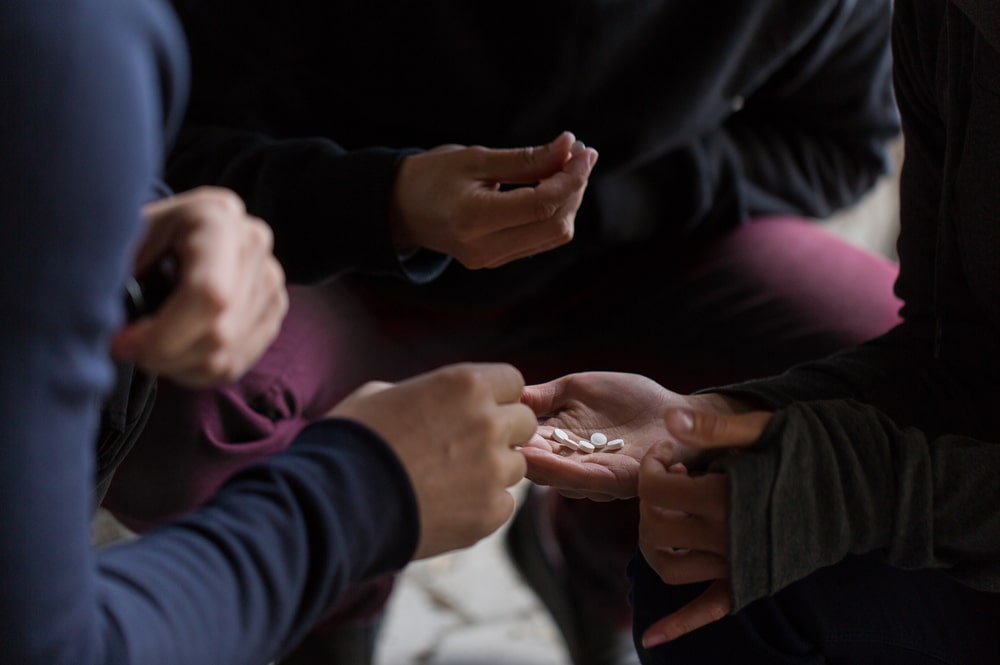Getting hooked on drugs or alcohol as an adult is tragic in its own right. But seeing a young person struggle with substance and drug abuse is incredibly distressing and painful for their loved ones. Abusing drugs and becoming addicted as a teen can have lasting consequences, but there is hope. The sooner a young person gets into a treatment center for teenage drug addiction, the better.
Outside intervention can get teens back on track and also uncover any unaddressed mental health disorders or trauma that may be contributing to addiction. For parents and educators, it’s critical that they know and understand the signs, symptoms, and statistics related to teen drug abuse and addiction. Early intervention is key.

What are the most popular drugs that teens abuse?
The most popular drugs that teens abuse are alcohol, tobacco, and marijuana. However, certain drugs and substances are more likely to be abused by teens in different age groups.
For example, young teens from about the age of 12 to 15 are most likely to abuse inhalants such as glue, gas fumes, or household cleaners. Older teens from 16 to 19 are more likely to abuse prescription pills, with the most popular being stimulant drugs followed by prescription painkillers. Older teens are also more likely to abuse synthetic marijuana like K2 or Spice. The most commonly abused drugs by seniors in high school, besides tobacco and alcohol, are:
- 4% of high school seniors abuse prescription Adderall, a stimulant.
- 3% of high school seniors abuse prescription Vicodin, and an opioid pill.
- 6% of high school seniors abuse prescription OxyContin, and incredibly addictive and powerful prescription opioid.
What factors increase the chances of a teenager trying drugs and becoming addicted?
Teens naturally like to experiment, and it’s no wonder parents, and guardians lose sleep at night worrying about their teens trying drugs and becoming addicted. But certain risk factors can make addiction more likely for some teens.
- There is a genetic component to drug addiction, in that a teenager with a parent or sibling with substance use disorder has an increased chance of becoming addicted too.
- Teens who have been abused or who have undergone other forms of trauma are at higher risk of trying drugs and becoming addicted.
- Untreated mental health disorders can also increase the chances of someone becoming addicted to drugs. Mostly, depression and anxiety in the teen years are to blame for this risk factor.
- Prenatal exposure to drugs or alcohol can put a teen at risk of future addiction disorder.
- Being exposed to drug use within their peer group can give vulnerable teens access to drugs, and they can become addicted. A lack of parental supervision in this regard can also increase the chances of an adolescent getting hooked on drugs or alcohol.
Even if a teen has all or most of these risk factors for teenage drug addiction, drug addiction is such a complex disorder, and there are so many different factors that can influence a person’s chances of becoming addicted. Inherent personality traits can also increase or decrease the risk of addiction, and it’s nearly impossible to pin-down and predict whether or not an individual adolescent will become addicted to either drugs or alcohol.
Regardless of the risk factors, teens who live in a supportive, structured environment, and have a drug-free peer group are less likely to gain access to drugs than teens who do not have these things.
Are teenage girls or boys more likely to try drugs and become addicted?
Teenage boys are more likely to see drugs and alcohol as a way to relax socially and to have a good time with their friends. Teen girls, on the other hand, are more likely to view drugs and alcohol as a way to cope with stress and interpersonal problems at home. Parents of teen boys need to do an excellent job of supervising their children and monitoring their child’s peer group to prevent them from trying drugs. With teen girls, parents need to watch their daughter’s emotions and make sure she is not struggling with depression, stress, and interpersonal strife.
What are the most common symptoms of drug abuse and addiction in teens?
All diseases and disorders come with warning signs, and this includes addiction. Although not all teens will display the same symptoms – and some may have learned to hide them – these are some of the most common:
- Sudden changes in mood and personality.
- A drastic and sudden change in friends and peer group.
- Strange smells in the teen’s room or on their skin and clothing.
- Red, glassy eyes, pinprick or enlarged pupils.
- Missing important events, school, or work.
- Increased secretiveness and aggression or irritability.
- Clumsiness.
Even teenagers who never touch a controlled substance can go through significant emotional, mental, and physical changes. This makes identifying potentially dangerous shifts difficult for many parents to identify. Many worry about violating a child’s privacy or damaging a relationship if the parent is wrong about potential drug abuse. Parents or guardians who find themselves in this situation may want to discuss the issue with a professional who deals with mental health treatment for teens first, especially if they are considering rehab and/or therapy for their child. Having a team on board from the start may ease addiction treatment for teens for both parents and children. Going to a Southern California rehab facility may feel strange and embarrassing for teens, but having even a limited connection with a staff member in advance could help.
What can be done to help teens with drug addiction?
The course of treatment for addiction depends on many factors, including the severity of the addiction, and if a teen is also suffering from a co-occurring condition that could be influencing their addiction. A teenage addiction patient may need to spend some time in a medical detox facility. Drug addicts are often terrified of losing access to their drug of choice because painful and distressing withdrawal symptoms will occur. Reassuring a teen that a medical detox facility will make the detox process more comfortable may encourage them to attend rehab voluntarily.
In most cases, teenagers need to attend outpatient rehab so they do not miss school and can graduate on-time. In severe cases, a specialist may recommend that a teenager stays in inpatient rehab for several months.
Comprehensive aftercare programs are put into place once a teen leaves outpatient rehab. Each plan is customized to the patient, so what will work for one teen may not be necessary for another. In addition, teens can significantly benefit from therapy, including CBT, DBT, ERP, and ACT therapy methods. Sometimes, family therapy may be recommended for a teenage patient and their loved ones.

Is it appropriate to talk to teens about drug abuse?
Addiction treatment for teens often begins at home. Dealing with substance abuse and addiction early in life can spare teens from increased health risks as they grow. It is never too early to have a conversation with kids about drugs. Even elementary school children are usually exposed to drugs and alcohol through online videos, television, and stories from friends. You never know whose older sibling may have a problem, which children may tell a story about their dad going to AA, or something else. By the time children reach their teens, drugs and alcohol are neither taboo nor unknown.
Can teenage drug abuse affect those teens as adults?
Teen drug abuse can affect teens when they become adults because teens haven’t finished growing. Their brains, in particular, face risks. Addiction itself is a reprogramming of impulse control, perceived necessities, and brain chemistry. Studies show adolescent drug abuse may affect learning, memory, and executive function.
Neurological development is not the only thing at risk, however. Often, drugs and alcohol not only increase risk but may be directly responsible for various health conditions. Unaddressed substance abuse habits can lead to any or all of the following list, most of which can lead to death due to the following:
- Heart disease
- Liver damage
- Kidney failure
- Mental illness
- Hormonal effects
- Cancer
- Hepatitis
- HIV
Do teens often bring drugs and other controlled substances home?
Do teens often bring drugs and other controlled substances home?
Not all teens struggling with substance abuse risk bringing controlled substances into their homes, but it is common. Parents who suspect teens may be using drugs, alcohol, or other potentially life-threatening substances should be aware of popular hiding places. These include small spaces, like jewelry boxes or earbud cases, and in-between places people rarely look, such as between the mattress and box spring or in a book. Teens may also hide dangerous substances in their backpacks or handbags, in desk or dresser drawers, or in the empty spaces on the bottoms of those drawers.
Less conventional places include the dirt of potted plants, in over-the-counter pill bottles, and in customized containers designed to hide in plain sight. Even if a parent suspects there is a dangerous substance hidden in their home, they may not be able to find it, which is part of why face-to-face discussions are so important as part of mental health treatment for teens.
Supportive family and outside intervention from a team of trained, experienced rehab specialist is the most effective and safest way to get a teenager help for addiction. If you’re concerned that your teenager is hooked on drugs, there is support and guidance available.
The addiction specialists at Mission Harbor Behavioral Health have successfully treated hundreds of teens for drug addiction. Mission Harbor also offers support groups for family members of addicted teens, so you won’t feel so alone in your struggle. Please contact Mission Harbor today and get help for your child and your family.
The facilities at Mission Harbor are staffed with trained experts to best assist patients with their mental health issues. We are capable of dealing with any and all cases with a licensed staff, equipment, and approved techniques. Our mission is to help those who want to help themselves, and we support your decision in seeking help.
Get Help Now
Alcohol addiction is extremely difficult to overcome on your own.. Seek specialized help and let professionals guide you in your recovery.

